I'm trying to track down a suspected memory leak in a Python application which uses numpy and pandas as two of the main libraries. I can see that the application uses more and more memory over time (as DataFrames are processed).
Memory consumption per processing iteration (in MB):

I'd like to understand what the memory is used for. I therefore used tracemalloc, but I'm struggling to consolidate the output of tracemalloc. The program calls tracemalloc.start() and snapshot = tracemalloc.take_snapshot() after executing the suspicious code.
The stats is printed with:
gc.collect()
snapshot = tracemalloc.take_snapshot()
for i, stat in enumerate(snapshot.statistics('filename'), 1):
print('top_current', i, str(stat))
When I add up the size portion of the many (200-300) lines of e.g. top_current 11 <frozen importlib._bootstrap>:0: size=71.7 KiB, count=769, average=95 B (or similar), I get a few Megabytes as result. However the application is consuming memory in the Gigabyte range. Am I missing anything? How can I accurately see which objects reside in memory (and pose a potential memory leak)?
I also ran a set with PYTHONMALLOCSTATS=1. That test revealed an increased usage of Python memory arenas over the run of the program.
Small block threshold = 512, in 32 size classes.
class size num pools blocks in use avail blocks
----- ---- --------- ------------- ------------
0 16 32 7879 217
1 32 419 52669 125
2 48 1366 114740 4
3 64 4282 269734 32
4 80 2641 132005 45
5 96 904 37955 13
6 112 611 21971 25
7 128 518 16044 14
8 144 1728 48364 20
9 160 238 5931 19
10 176 3296 75808 0
11 192 129 2691 18
12 208 125 2365 10
13 224 414 7434 18
14 240 95 1512 8
15 256 88 1319 1
16 272 78 1085 7
17 288 69 958 8
18 304 651 8458 5
19 320 57 676 8
20 336 118 1415 1
21 352 58 631 7
22 368 44 476 8
23 384 44 440 0
24 400 53 523 7
25 416 90 810 0
26 432 115 1026 9
27 448 97 864 9
28 464 92 732 4
29 480 75 593 7
30 496 88 703 1
31 512 137 953 6
# arenas allocated total = 614
# arenas reclaimed = 321
# arenas highwater mark = 293
# arenas allocated current = 293
293 arenas * 262144 bytes/arena = 76,808,192
# bytes in allocated blocks = 75,168,000
# bytes in available blocks = 70,352
0 unused pools * 4096 bytes = 0
# bytes lost to pool headers = 900,096
# bytes lost to quantization = 669,744
# bytes lost to arena alignment = 0
Total = 76,808,192
The number of arenas (293 in the above example) seems to be increasing. That's a problem in itself, but it accounts for ~76MB only. The application however (measured by proc = psutil.Process(os.getpid()); proc.memory_info().rss and htop which are equivalent) shows memory allocation in the range of Gigabytes (~2GB when the above stats were printed).
What's allocating all that memory, if it's not Python's arenas/pools/blocks? What else could I try to measure to consolidate the memory consumption shown in htop?